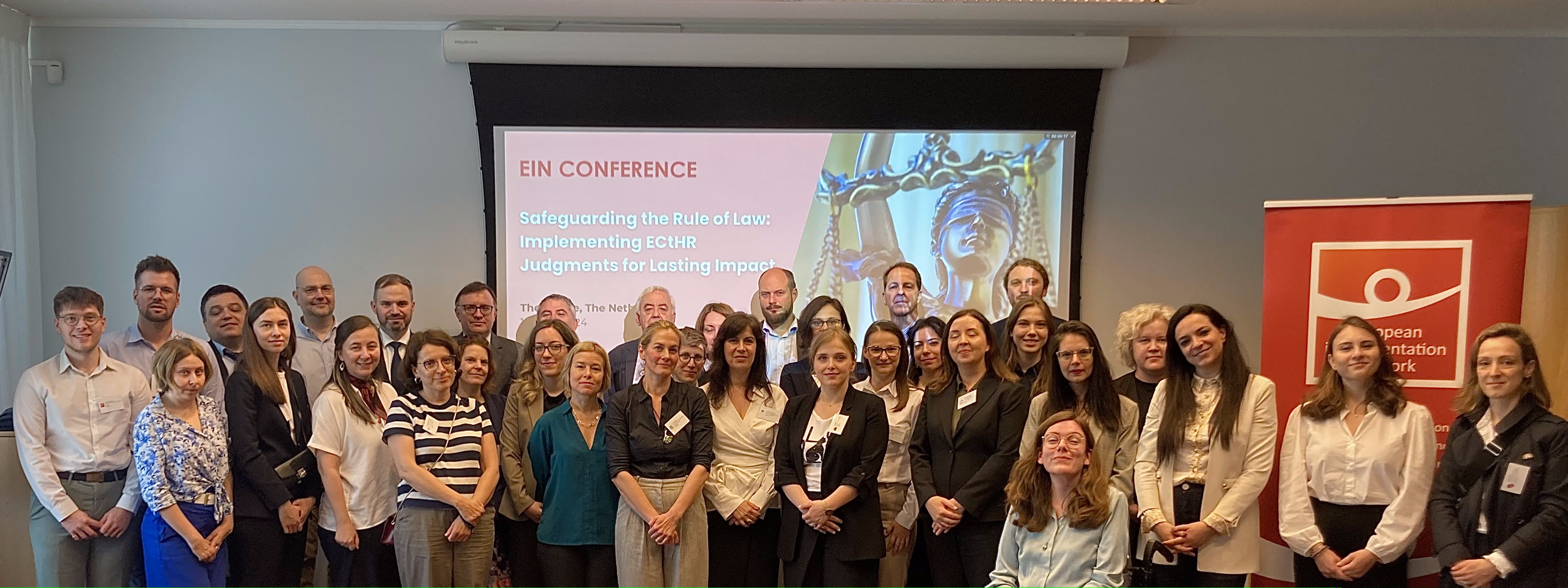
In January 2024, at the behest of the European Implementation Network’s (EIN) member organisations which operate in countries where the rule of law backsliding is or has until recently been an acute problem, and with the kind support of the Ministry of Foreign Affairs of the Netherlands, EIN launched a one-year project on “Promoting the Rule of Law in Europe through the Implementation of Judgments of the ECtHR Concerning Independence and Impartiality of the Judiciary”. The idea stemmed from the identification of the lack of an established network of practitioners working on the implementation of ECtHR rule of law judgments who could share information and expertise, success stories, the reasons behind them and the degree of their sustainability, as well as strategies to help overcome implementation stumbling blocks in rule of law judgments of the ECtHR.
Halfway through our Project: Promoting the Rule of Law in Europe through the Implementation of Judgments of the ECtHR Concerning Independence and Impartiality of the Judiciary, which aims at empowering civil society and practitioners across Europe to promote rule of law reforms by fostering knowledge of the implementation of ECtHR judgments, EIN organised, on 19 June 2024, a conference on “Safeguarding the Rule of Law: Implementing ECtHR Judgments for Lasting Impact” in The Hague, The Netherlands. Through this conference, kindly supported by the Ministry of Foreign Affairs of the Netherlands, EIN sought to establish a network of practitioners working on the implementation of ECtHR rule of law judgments who could share information and expertise, success stories, the reasons behind them and the degree of their sustainability, as well as strategies to help overcome implementation stumbling blocks in rule of law judgments of the ECtHR.
After having allowed the wealth of information exchanged in the context of the conference to sink in, let’s take a look at the gist of the important discussions held in the Hague one month ago.
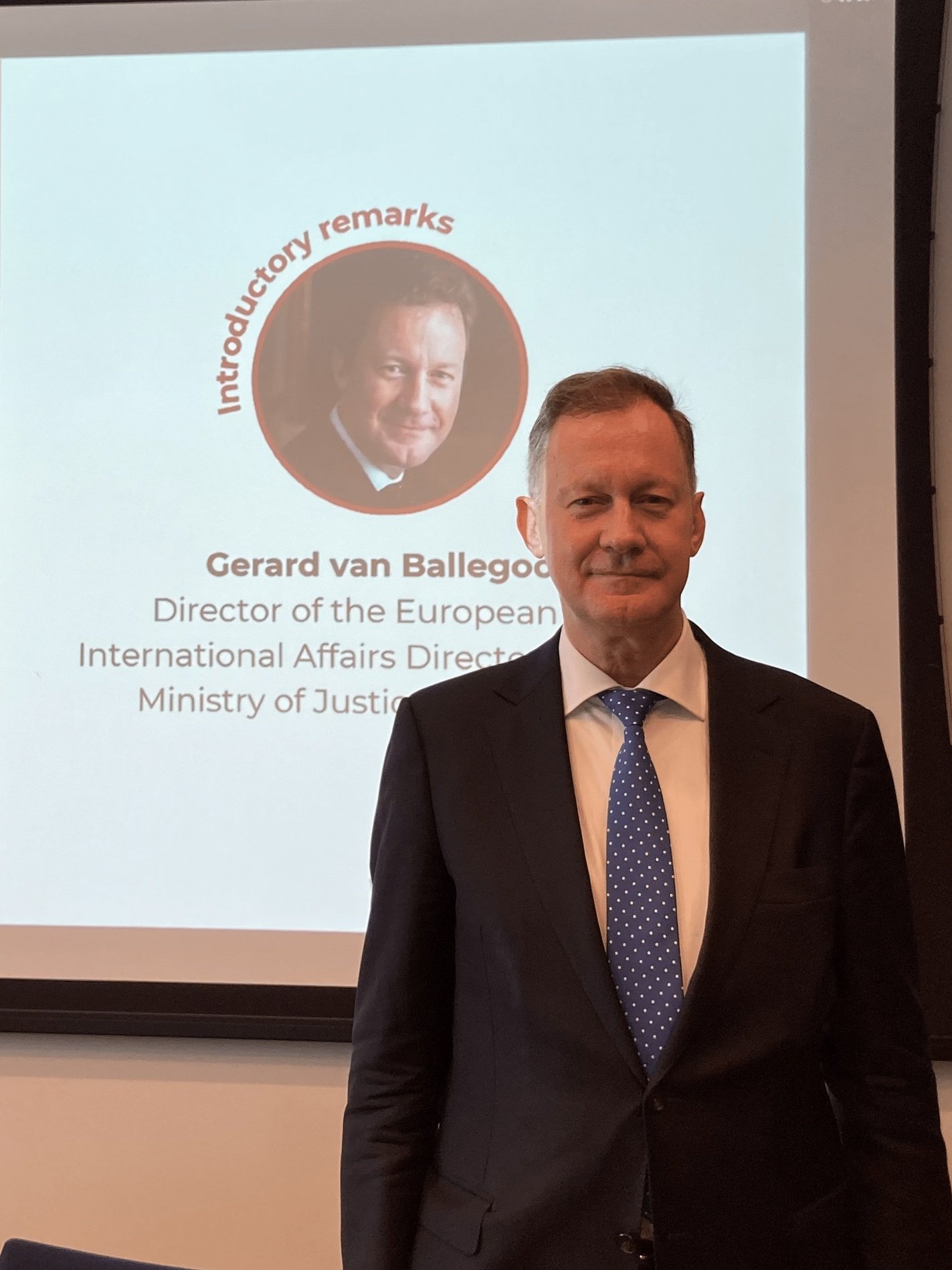
The conference, which brought together more than 40 prominent civil society representatives and academics, including key figures in the rule of law area of expertise was opened by EIN Chair Prof. Dr. Başak Çalı, who welcomed participants and presented the programme of the conference. Gerard van Ballegooij, Director of the European and International Affairs Directorate of the Ministry of Justice and Security of the Netherlands, which hosted the event, also provided, in his turn, welcome and introductory remarks. The Director furthermore highlighted the importance the Netherlands place on rule of law questions, the prominent place the relevant issues occupy in the Dutch policy-making, as well as the relevance and timely nature of the EIN Conference in the light of the important challenges the rule of law is faced with Europe-wide.
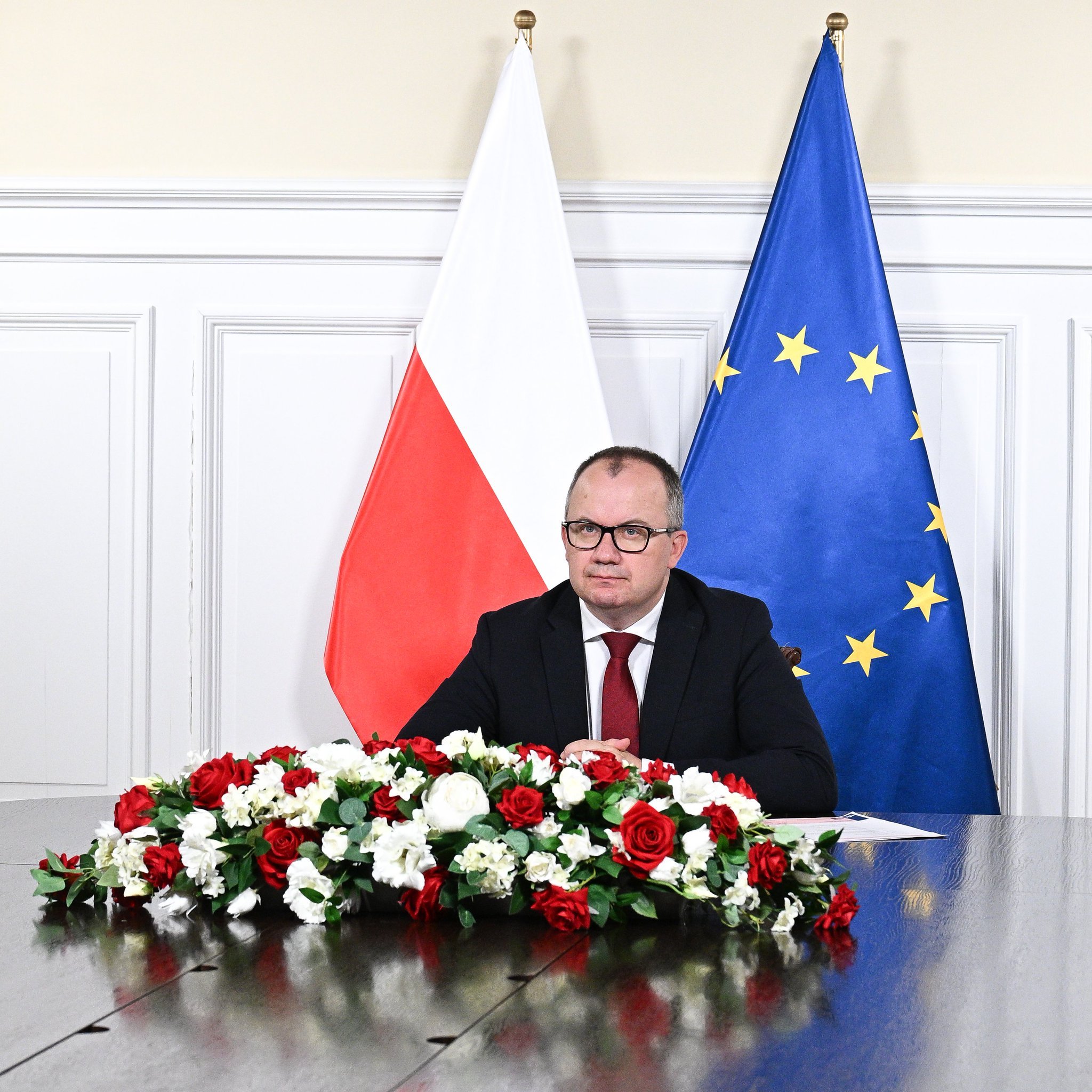
We were honored to welcome online Dr. Adam Bodnar, Minister of Justice of Poland, who gave a keynote speech addressing the importance of the Convention system and its implementation mechanism as cornerstones in the joint efforts for upholding the rule of law. Dr. Bodnar captivated the audience by expertly discussing the status of reforms and measures required for the implementation of European Court judgments concerning the independence of the Polish judiciary, as well as the important challenges that need to be overcome along the way. He furthermore stressed the need for guidelines to shape rule of law-upholding efforts and the importance of involving all legal and political forces in this process, including civil society and international actors.
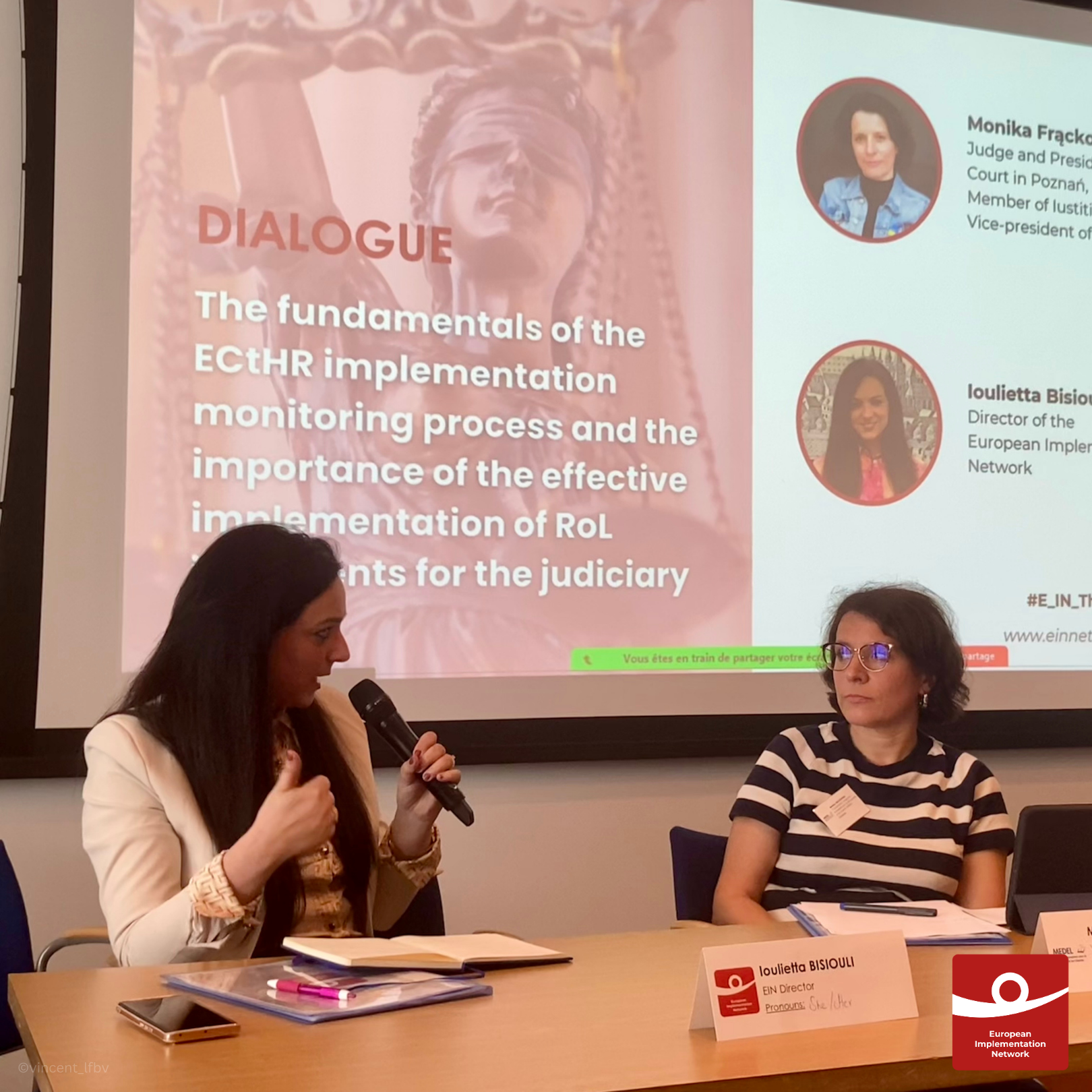
The panel discussions were prefaced by a dialogue between Ioulietta Bisiouli, EIN Director, and Monika Frąckowiak, judge and Vice-President of the European association of judges Magistrats Européens pour la Démocratie et les Libertés (MEDEL). The discussion focused on the importance of effective implementation of ECtHR judgments concerning the independence and impartiality of the judiciary, the particular implementation challenges raised in this effort as per the nature of the ECtHR judgments pertaining to the rule of law, and the role of the Council of Europe implementation mechanism in this process. The already highly politicised nature of the rule of law-related ECtHR judgments, which makes them by definition candidates for examination under the enhanced supervision procedure, was identified as a major challenge. At the same time, the leverage that other relevant Council of Europe institutions, in particular the Venice Commission, can exercise to push for necessary reforms in the rule of law sector was also acknowledged. The discussion furthermore focused on the important consequences of non-implementation for judges. It also delved into the reasons for the judges’ reluctance to come forward with their complaints related to their harassment, which results in low numbers of relevant ECtHR judgments in jurisdictions faced with well-identified and-documented challenges in the area of the rule of law. The chilling effect of the ongoing harassment judges are subjected to was highlighted as one of the major relevant reasons.
Panel 1: Factors facilitating implementation in the rule of law cases: best practices, achieved progress and ongoing concerns
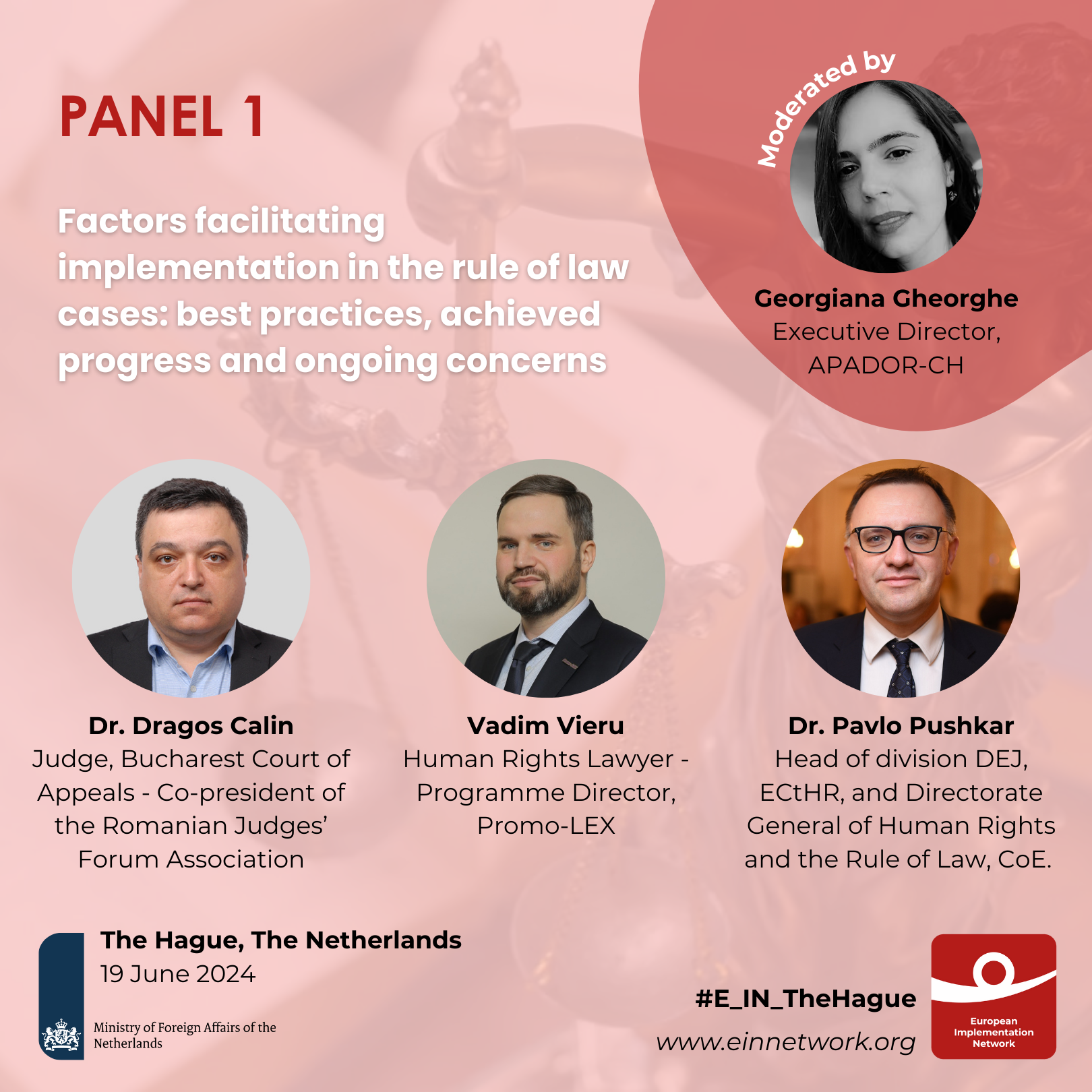
The first panel discussion, moderated by Georgiana Gheorghe, Executive Director at APADOR-CH, delved into judgments whose examination has been closed by the Committee of Ministers, or judgments in respect of which certain progress has been achieved implementation-wise. Dr. Dragos Calin, Founder and Co-president of the Romanian Judge's Forum discussed the implementation of rule of law judgments in Romania through the reform of the 2022 justice laws, as well as ongoing and new inventive means of controlling the judiciary. Vadim Vieru, Lawyer at Promo-LEX, then discussed the reform of the Superior Council of Magistracy in Moldova, which de-politicised this important judicial institution, focusing on the importance of the existence of a strong political will when it comes to achieving groundbreaking reforms in the wake of a violation-finding judgment of the ECtHR. Dr. Pavlo Pushkar, Head of Division at the Department for the Execution of Judgments of the ECtHR, Directorate General of Human Rights and the Rule of Law at the Council of Europe, discussed the complex implementation process of the Volkov judgment in Ukraine, exploring in a highly expert manner the issue of judicial independence in the age of subsidiarity and the history of the legal reforms dealing with the creation and establishment of bodies dealing with judicial discipline.
Panel 2: Pockets of resistance to the implementation of ECtHR rule of law judgments — Any small windows of opportunity in an otherwise uphill struggle?
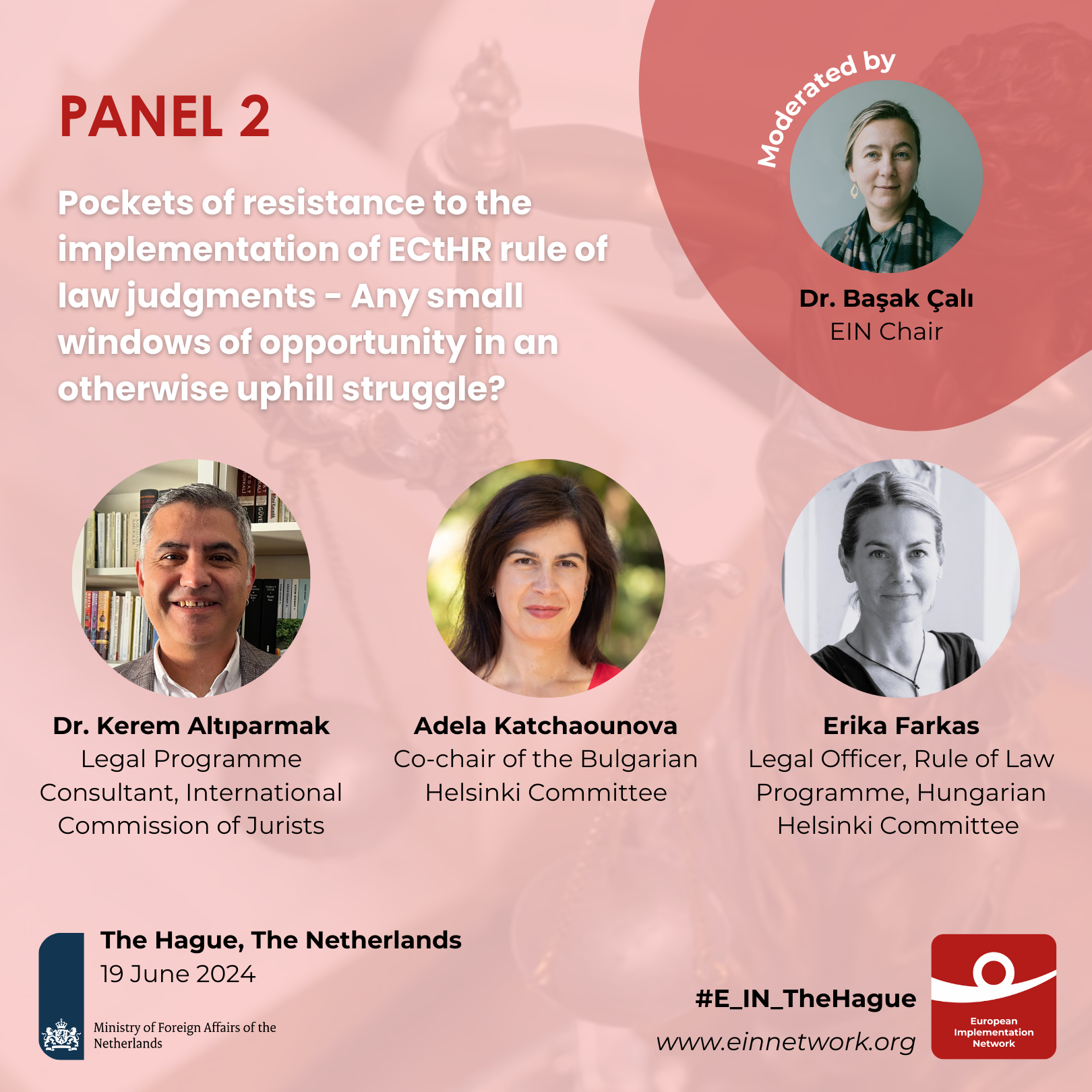
The second panel, moderated by Prof. Dr. Başak Çalı, EIN Chair, explored the status of rule of law-related ECtHR rulings which constitute implementation stumbling blocks. Dr. Kerem Altiparmark, EIN Board member and Legal Programme Consultant at the International Commission of Jurists, portrayed a bleak picture as regards the scale of the rule of law problems in Turkey, in relation in particular to the judgments concerning the detention, sanctioning and transfer of vociferous judges. Adela Katchaounova, Co-Chair of Bulgarian Helsinki Committee then concentrated on the silencing of judges through disciplinary proceedings as seen through the lens of the Miroslava Todorova v. Bulgaria judgment. She addressed the changes in the authorities’ approach, as seen in the implementation action plans throughout time, as a first positive result of the impact generated by the light shed on the rule of law problem in Bulgaria through the ECtHR judgment. Nevertheless, limited progress has been achieved so far towards the final resolution of the underlying problem, and ongoing concerns regarding the chilling effect on the judiciary generated by the continued harassment against judges. Finally, the situation in Hungary was presented by Erika Farkas, Legal Officer of Rule of Law Programme at the Hungarian Helsinki Committee, who discussed about the state of play in the implementation of the Baka v. Hungary judgment, the impact civil society monitoring of judicial independence can have even amidst adverse legal and political circumstances, and, therefore, the importance of persistently pointing out continuous and unresolved implementation gaps.
Panel 3: The Polish “rule of law laboratory”: Competing fundamental principles — What lessons learned from the Albanian example?
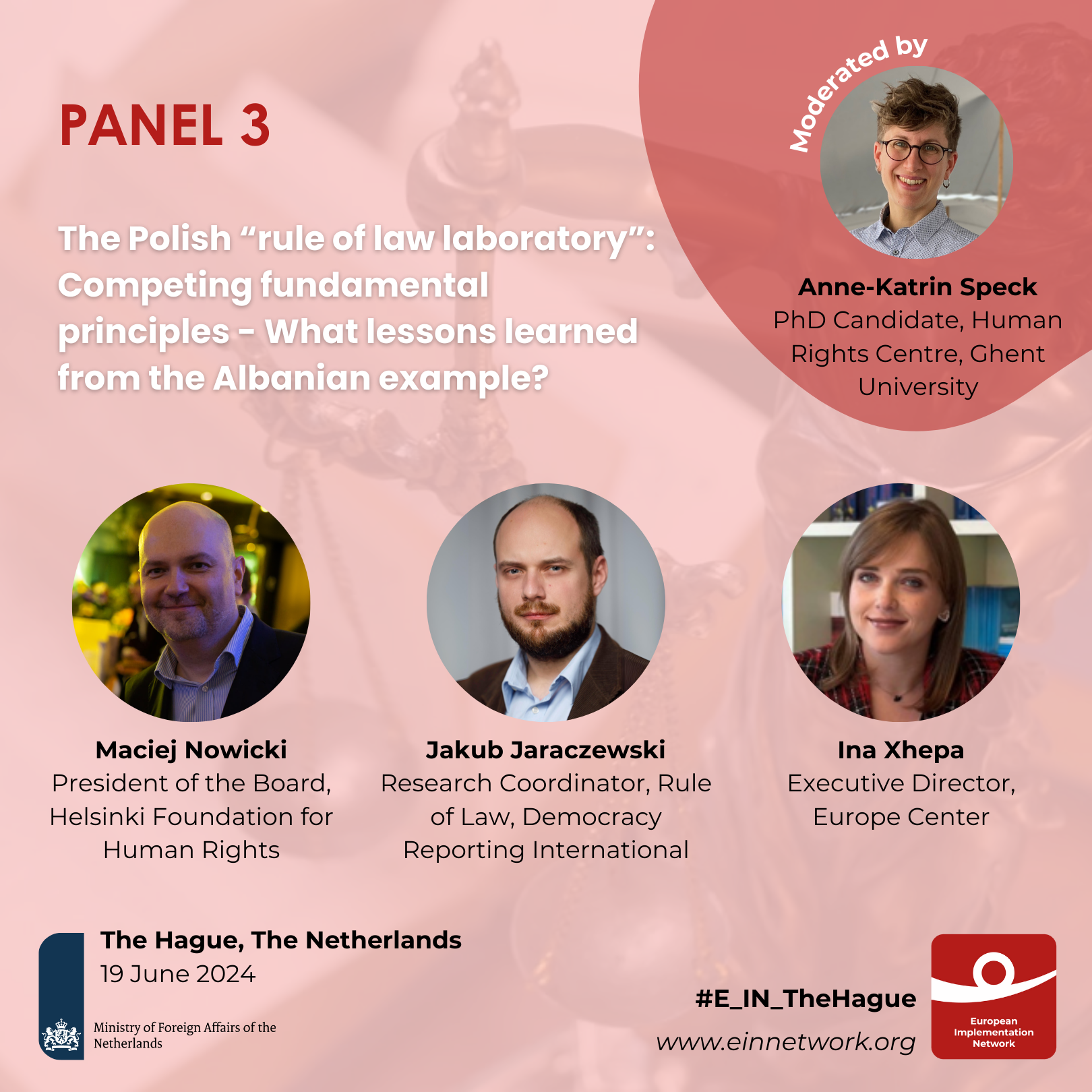
The relay was then passed on to the third panel moderated by Anne Speck, PhD researcher within the Human Rights Centre at Ghent University and EIN Board Member, to address highly topical questions regarding the implementation of rule of law judgments in respect of Poland against the background of the recent change in the political environment in the country, examined against the background of solutions found in Albania, a jurisdiction faced with comparable dilemmas - albeit stemming from utterly different circumstances and considerations. Dr. Jakub Jaraczewski, Research Coordinator at Democracy Reporting International (DRI) discussed the proposals for reform of the Polish Constitutional Tribunal and the need to balance the principle of legal certainty with the principle of rule of law when carrying out these reforms, while delving into the question of whether the current form of the Constitutional Court should be safeguarded, and, if so, how. Maciej Nowicki, President of the Board of the Helsinki Foundation for Human Rights (HRHF) discussed the problem of unlawfully appointed Polish judges (or “so-called” neo-judges) and the two-model solutions proposed so far by legal practitioners, scholars and technocrats: re-election of judges for all posts which had been affected by unlawful removals of judges, or the approach of individual verification and vetting of the current holders of these positions. Finally, Ina Xhepa, Executive Director of the European Centre in Albania, discussed the reform on vetting in the judiciary in Albania in the recent years, the role of the Venice Commission in this process, and the ensuing difficulties for the Albanian judiciary, in an effort to assess which lessons could be (and which should not) transposed for the Polish reform with a view to avoiding similar problems.
Panel 4: Novel aspects of and approaches to the rule of law problem
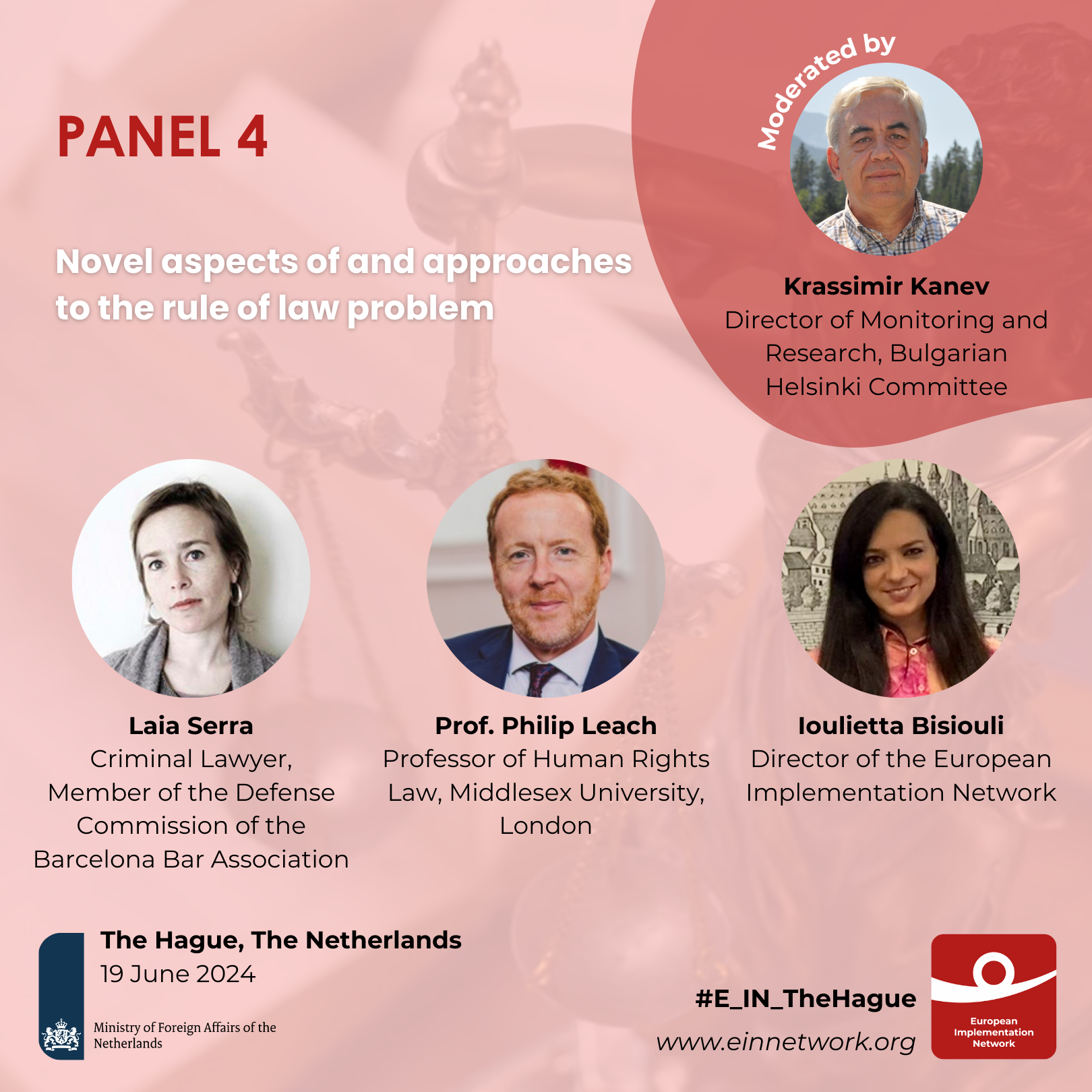
A fourth panel was moderated by Dr. Krassimir Kanev, EIN Treasurer and Monitoring and Research Programme Director at the Bulgarian Helsinki Committee. The relevant exchange approached both novel aspects of the rule of law problem, as well as new approaches proposed to effectively tackle the rule of law problem in the context of the Strasbourg institutions. Laia Serra, Criminal Lawyer and member of the Defense Commission at the Barcelona Bar Association, presented novel, not obvious, at first sight, rule of law problems emerging from the harassment of judges who had expressed pro-Catalan independence views in Spain. Prof. Philip Leach, Middlesex University, EIN Vice-Chair, explored the potential of grounding litigation Article 18 of the Convention, exemplifying cases which had led to individual measures of redress, and the need for increased pressure from the Committee of Ministers of the Council of Europe. Finally, EIN Director, Ioulietta Bisiouli presented lessons learned from the litigation and implementation of judgments concerning the independence of the judiciary and set forward new ideas about how to litigate strategically in view of implementation, how to include the political context in litigation and exchanges with the Committee of Ministers in order to expand the scope of litigation.
Wrapping up of the exchanges among practitioners through the insights of academia

In the last panel, wrapping up the exchanges, Rick Lawson, Professor of European Human Rights Law at Leiden University, emphasised the need for Member states to invest in the implementation process rather than excessively relying on international institutions, as well as the need for countervailing powers at the domestic level. He pointed out the fact that judicial independence is part of a much larger ecosystem, which makes it difficult to address rule of law backsliding in rule of law cases. Prof. Lawson addressed the fact that there is more leeway for NGOs to address rule of law issues, and their role in doing so could expand in the future. EIN Chair Prof. Dr. Başak Çalı also provided final insights, stressing the importance of collective learning, the need to define expectations for government action plans and reports to prevent “back and forth” type situations, as well as the need to bring in political and the sociological expertise on matters of implementation.
In her concluding remarks, EIN Director Ioulietta Bisiouli underlined the similar problems faced by different countries and the need for mutual support in rule of law implementation matters, thanking speakers, participants and organisers alike for their participation.
We extend our gratitude to the Ministry of Foreign Affairs of the Netherlands, whose kind support has made the organisation of this conference possible.
